Citizens of Carolina
Posted on Sept. 14, 2017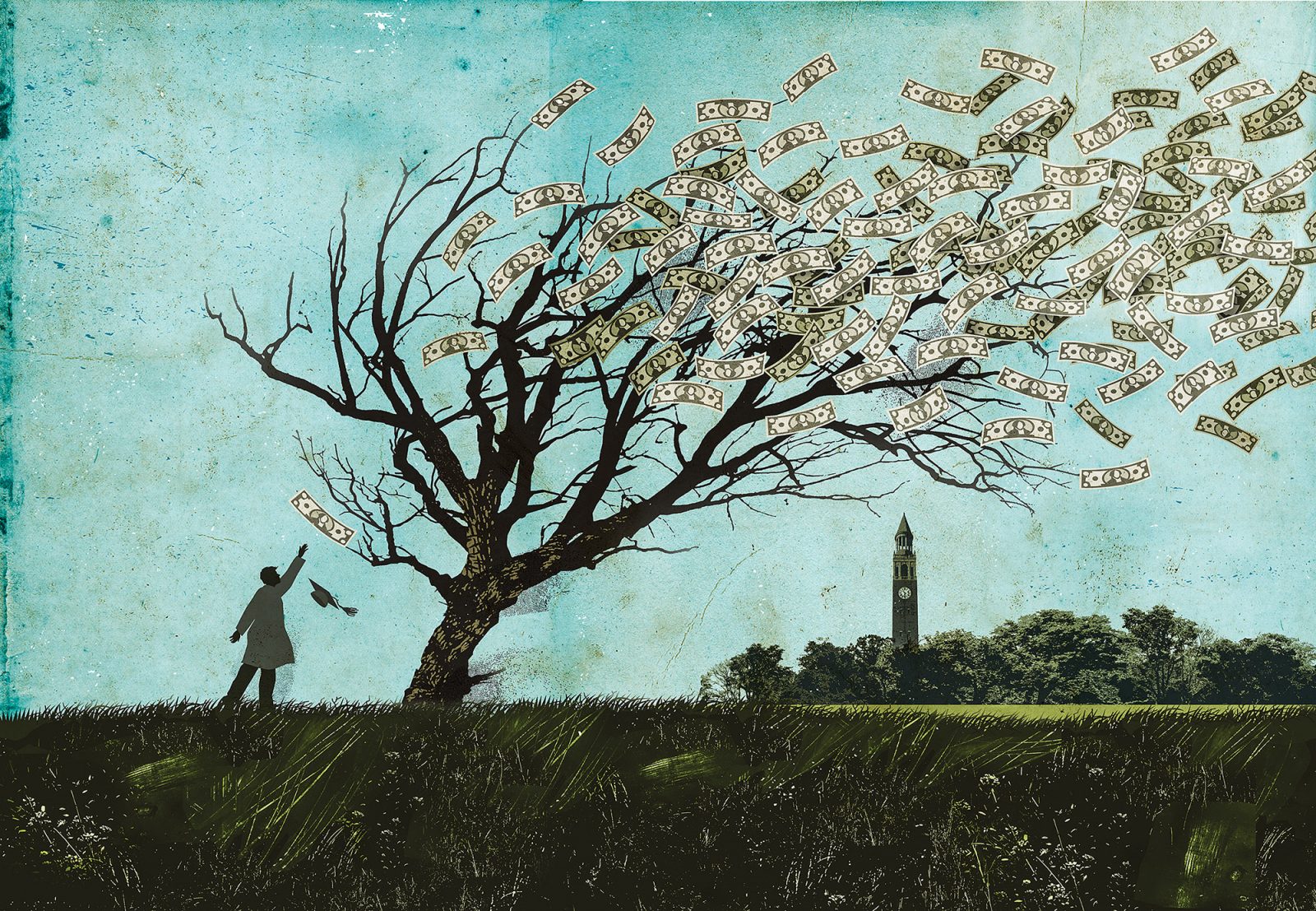
Illustration by Sam Ward
The children of undocumented immigrants who can get into Carolina have been welcome here. The out-of-state tuition rate makes paying for it tough, and now their special status could be taken away.
by Barry Yeoman
This summer, José Cisneros ’17 left North Carolina and headed north to earn a master’s degree in education from Notre Dame. Cisneros has a career plan: He wants to teach for a few years after graduate school, then make a transition to educational nonprofits or administration.
It’s been a remarkable journey for someone who almost didn’t survive gestation. Cisneros’ mother was pregnant with him when she was shot in the belly during a bungled kidnapping attempt at their home in Morelia, Michoacan, Mexico. For his father, “the world just fell apart,” José says. Two lives were in peril, their fates uncertain — plus, there was a 2-year-old daughter to tend to and a bakery to keep running.
Cisneros’ mother eventually did recover. But the medical bills, along with time off for caregiving, cost his father both the bakery and their home. The family moved into a two-room apartment, and his father worked as a security guard. The pay was low; finances suffered even as he pulled 24-hour shifts. Neither parent had finished elementary school.
“My dad had these plans for his children: to get an education, become professionals,” Cisneros said. Opportunity lay in North Carolina, where two relatives worked at a pork-processing plant. But his father wanted to keep the family intact. “He said we’re all going,” Cisneros says. “Or no one is.”
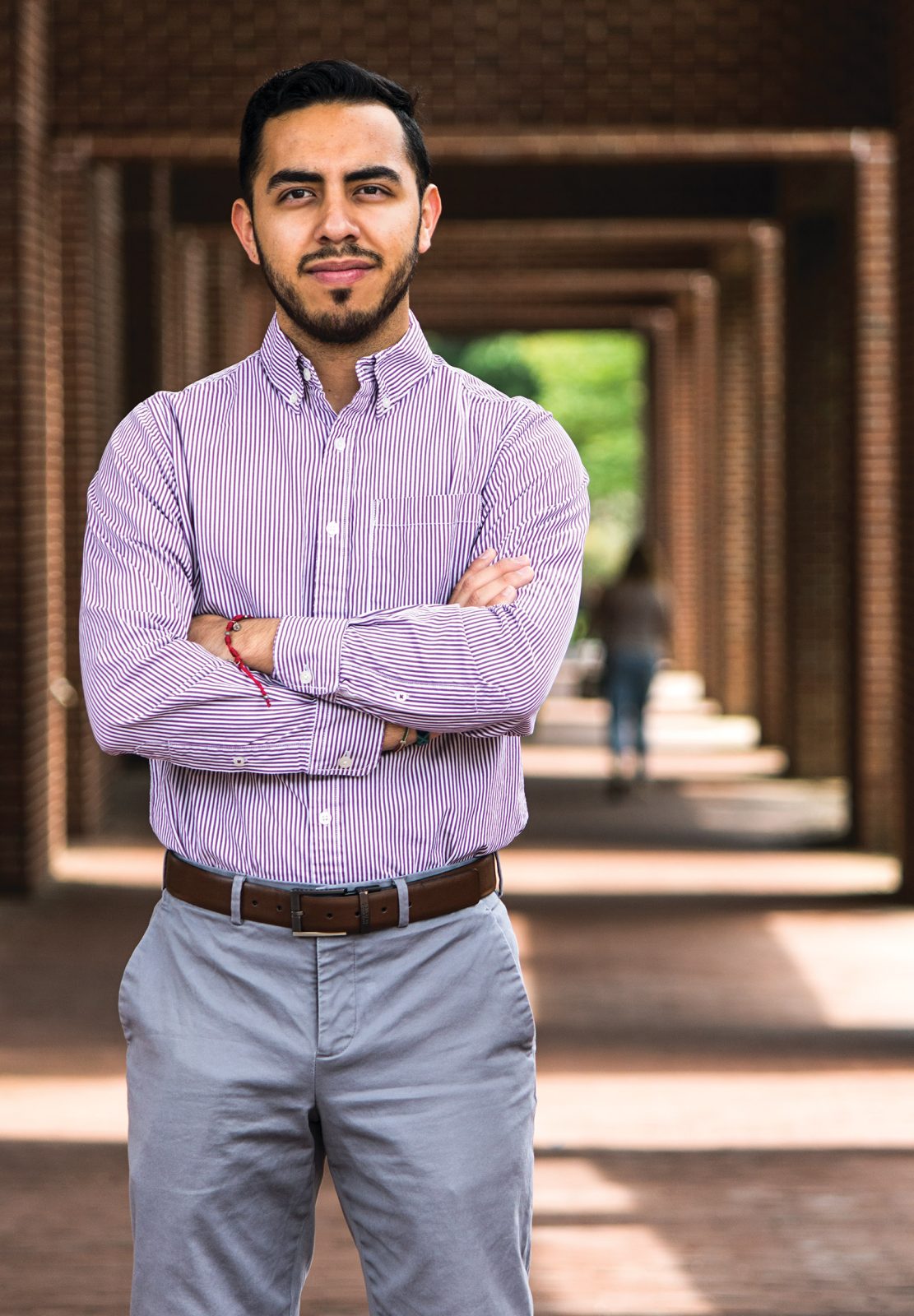
José Cisneros ’17 found out in grade school that he was good enough. North Carolina wanted him, and a South Carolina nonprofit knocked down the financial barrier. (Photo by Jason D. Smith ’94)
In 1999, when Cisneros was 5, the family crossed the Mexico-U.S. border without authorization — walking through the desert at night, squeezing into cramped cars, his mother pulling thorns from her feet, his sister getting sick from the fast-food burgers that sustained them. They settled into Snow Hill, an eastern North Carolina town of 1,600, greener than any place Cisneros had ever seen. But it became evident that his father’s paycheck didn’t stretch quite far enough. His mother, who had hoped to raise the children full time, instead took jobs harvesting tobacco, sorting sweet potatoes and arranging plants at a local nursery.
Cisneros landed at an elementary school where he didn’t know the language. In kindergarten, he could speak to only two classmates, who would translate his requests to use the restroom or call his mother. He was held back that first year, but children are quick learners, and by the end of first grade he spoke fluent English. Shortly after that, the family moved across the county line, and he tested into his new school’s gifted-and-talented class.
“I never realized I was smart,” he said.
Those smarts might have gotten Cisneros nowhere — “deportation was always a looming dark cloud above our home,” he said — if not for an Obama-era directive that allows him to study and work legally in the U.S. In 2012, when Cisneros was in high school, then-Secretary of Homeland Security Janet Napolitano announced the Deferred Action for Childhood Arrivals program. Open to applicants between 15 and 30, it was aimed at those like Cisneros who came to the country as children.
As one of more than 780,000 DACA recipients, Cisneros knows he’s currently protected from deportation. He also knows that his protection, which comes in two-year increments, can disappear at any time. On Sept. 5, the threat became more palpable: Attorney General Jeff Sessions announced that President Donald Trump was phasing out the program and delegating the fate of childhood arrivals to a divided Congress.
Nonresident tuition, no aid
Then-President Barack Obama had made it clear that the policy was a half-measure. “This is not a path to citizenship,” he said. “It’s not a permanent fix. This is a temporary stopgap measure that lets us focus our resources wisely while giving a degree of relief and hope to talented, driven, patriotic young people.”
A surer fix, Obama said, would be the passage of the DREAM Act, which would have offered permanent residency to some childhood arrivals like Cisneros. That legislation never passed.
The limitations of DACA in North Carolina have kept enrollment low at Carolina. Famous for telling prospective students that if they can get admitted the University will pull out the stops to help them financially, it has almost no options for DACA recipients. By state law, those students pay out-of-state tuition and cannot receive government aid. They are not eligible for the Carolina Covenant, which helps the lowest-income students with a package that includes federal and state grants.
“ Deportation was always a looming dark cloud above our home.”
–Jose Cisneros ’17
The University doesn’t track the number of DACA recipients among its student body, but estimates top out in the low two figures. (It does track citizenship and applies the nonresident tuition to all students who do not declare U.S. citizenship.) “We’re able to support less than 10,” said Rachelle Feldman, director of scholarships and student aid. “There are more than that here. I’m just not sure how many.”
DACA has been a blessing to many young immigrants. It has enabled them to get driver’s licenses and travel locally without breaking the law. It has opened doors for licensure and employment. And it has spurred some to continue their education.
“Having DACA status made people more excited about staying in school because they had authorization to work afterwards,” said Hannah Gill ’99, director of UNC’s Latino Migration Project, who has researched the policy’s impact in North Carolina.
“Once I had DACA, I realized, ‘Wow, I may actually be able to go to college,’ ” said Rubi Franco Quiroz, a senior who is studying to become a medical social worker. Franco’s family moved to Chapel Hill when she was 6, escaping drug-cartel violence and economic hardship in the Mexican border town of Reynosa, Tamaulipas.
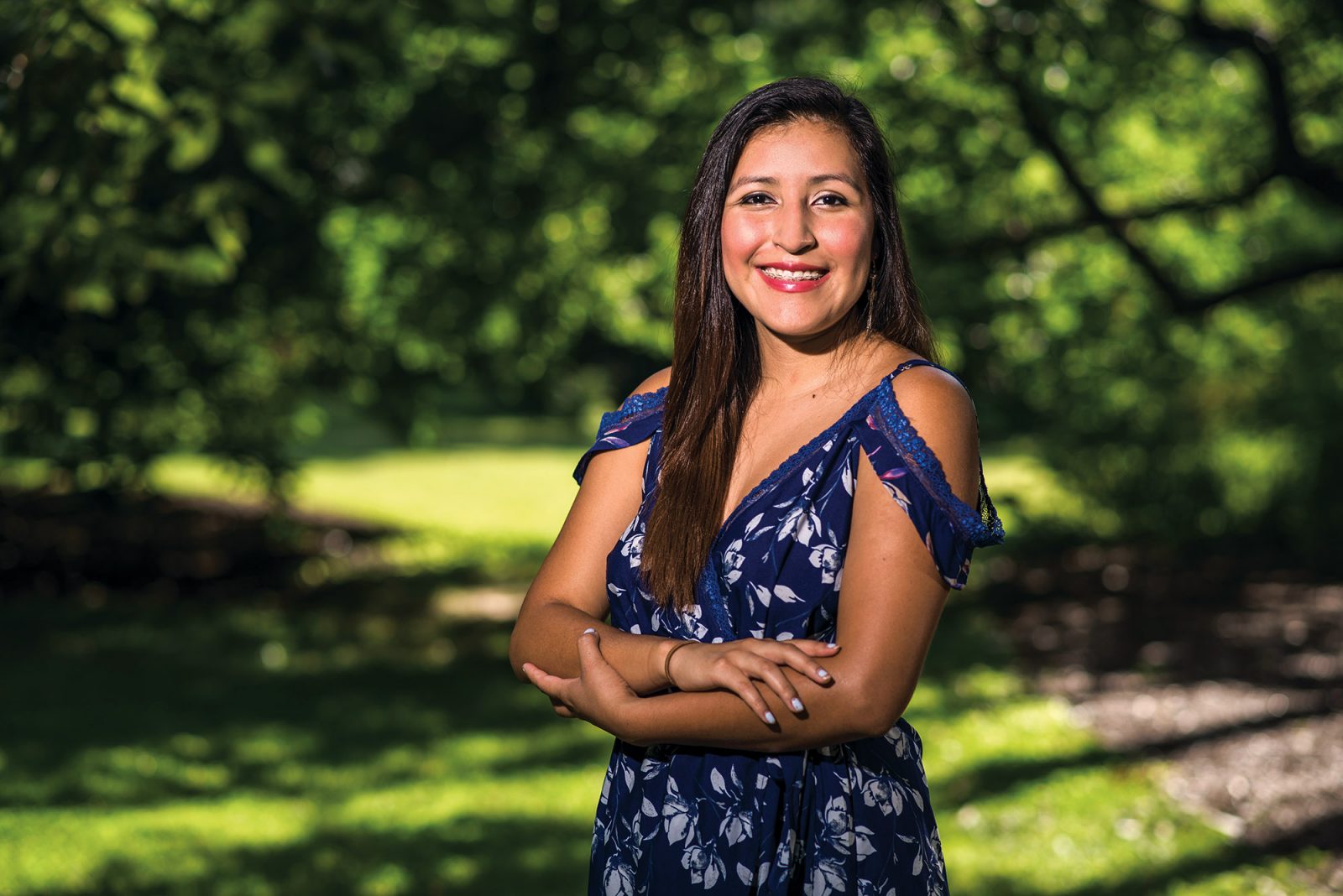
Rubi Franco Quiroz, studying to be a medical social worker, says disclosing personal information can make DACAs vulnerable, and she worries the program could be ended. (Photo by Grant Halverson ’93)
By elementary school she was thinking about college and participating in math competitions and cheerleading. She received DACA protection during high school, and the benefits started accruing immediately. She worked legally at a pizza restaurant, where she earned enough to pay for clothes, school supplies and a car. Later, when she was an undergraduate, she was able to visit Mexico to see her grandmother, who has breast cancer and heart disease, without fear of being apprehended at the border.
If DACA offered some comfort to students like Franco and Cisneros, that feeling started dissolving during the 2016 presidential race. In August, then-candidate Trump promised to “immediately terminate” the policy, which he described as an unconstitutional amnesty. “Anyone who has entered the United States illegally is subject to deportation,” the Republican nominee said during a speech in Phoenix, reiterating a 2015 pledge. “That is what it means to have laws and to have a country.”
After the election, Trump softened his rhetoric. “We’re going to show great heart,” he said in February. “DACA is a very, very difficult subject for me … because you have these incredible kids in many cases.” But news reports kept the alert level high at Carolina. Last winter — in one of several similar cases — federal agents near Seattle arrested DACA recipient Daniel Ramirez Medina as he slept on his father’s sofa, then detained him for six weeks. The government claimed the 23-year-old was a “self-admitted gang member.” Ramirez and his lawyers called this a fabrication, saying that agents mistook a tattoo honoring his Mexican birthplace.
In July, 10 state attorneys general threatened to sue the government if Trump didn’t rescind DACA. That set the stage for Sessions’ September announcement: that Trump would end the program “in light of imminent litigation” over executive power. The attorney general promised an “orderly, lawful wind-down” in the hopes that Congress would enact its own protections within six months.
“Once I had DACA, I realized, ‘Wow, I may actually be able to go to college.’”
–Rubi Franco Quiroz
Chancellor Carol L. Folt called Trump’s decision contrary to “Carolina’s heartfelt commitment to all members of our community” and called on Congress to enact a permanent fix.
U.S. Sen. Thom Tillis, a North Carolina Republican, immediately announced new legislation to provide a “fair and rigorous path” to legal status for undocumented children. Sen. Lindsey Graham, a South Carolina Republican; and Sen. Dick Durbin, an Illinois Democrat, vowed a renewed push to pass the DREAM Act.
“Do not give up hope,” Durbin said after Sessions’ announcement.
Hope, for some, has been in short supply, though. “That’s a scary thought: that we won’t be able to work in what we spent our entire lives working towards,” Franco said. Compounding her fear is the fact that applying for DACA meant disclosing personal data. “All my information’s in there. What’s an easier pool of people to grab than the people that are already in the system?”
Learning his own history
José Cisneros graduated as his high school’s valedictorian in 2013. He already had visited Chapel Hill, which became his “dream school.” He felt a sense of community on campus and appreciated the University’s academic reputation. Staff members addressed his immigration status forthrightly and supportively.
When applying to colleges, he said, “it finally hit me all the difficulties that came with being undocumented.” With tuition high and aid scarce, he worried that maybe his hard work would come to nothing. But Cisneros proved fortunate: He was named to the first class of Golden Door Scholars, the product of a South Carolina-based nonprofit that helps high-achieving undocumented students with school funding. He also received a privately funded merit-based scholarship from the University. Between the two, he had won a full ride to Carolina.
He arrived unsure about his career plans. He declared a history major — he had “always been in love” with the subject — and as a freshman took Associate Professor Kathryn Burns’ survey course “Latin America Since Independence.”
“I really didn’t know about my own history. What interested me was how we group this entire region and all these people together. Learning about how diverse it really is — how a lot of parts have African roots mixed with Spanish blood and indigenous blood, and the syncretism of religions — I was really captivated.”
“I had a lot of other friends that had great grades, great extracurriculars, and they couldn’t go to college because they couldn’t pay for it.”
Cisneros decided to concentrate on Latin American history. DACA enabled him to spend a semester in Guanajuato, Mexico, where he studied the country’s feminist movement and modern cinema. He also dove deeper that semester into 19th- and 20th-century history, particularly the period leading up to the 1910 Mexican Revolution. “More importantly,” he said, “I reconnected with my home country.” Every two weeks, he traveled 200 miles round trip to visit relatives in Morelia, including cousins who were born after his family left.
To explore the career question, Cisneros turned to extracurricular activities. He volunteered with NC Sli (formerly the Scholars’ Latino Initiative), a mentoring program that pairs UNC undergraduates with nearby high school students. Cisneros spent three years working with a teen in Siler City, bright and undocumented like himself: helping develop his writing skills, taking him on college tours, working with him to produce a video for a scholarship application. When Cisneros learned that his mentee had won a Golden Door scholarship — as Cisneros had four years earlier — “I was super-ecstatic.”
He eventually became one of NC Sli’s two student co-directors. (The other was Franco.) “I enjoyed being with students and helping them grow as people and scholars and intellectuals. And being in the community exposed me to a more complex understanding of educational issues.” He joined another mentoring group and then, as a junior, added a minor in education.
Cisneros never lost sight of his privilege as one of Carolina’s few DACA recipients. “I’m very blessed,” he said. Back in eastern North Carolina, “I had a lot of other friends that had great grades, great extracurriculars, and they couldn’t go to college because they couldn’t pay for it.”
During an internship with Student Action with Farmworkers, he lobbied state legislators to make in-state tuition available to all North Carolinians regardless of immigration status. He also met with campus administrators and UNC System President Margaret Spellings. Cisneros says he’s been received well at those meetings but wishes UNC’s leaders would advocate more forcefully for undocumented students.
“The office [of scholarships and student aid] is aware of this issue, and they’re willing to find opportunities for deserving students,” he said. “But overall, the [UNC] System and this institution could take a louder stance on the issue. If our University could make a larger statement, it would mean a lot and others would follow.”
Spellings’ support
Spellings, who was secretary of education under President George W. Bush, took a strong stand in February: In a Washington Post op-ed column, she criticized Trump for creating a “climate of fear” and urged him to maintain Obama’s DACA directive. “With immigration policy thrown into disarray, these students are paralyzed,” she wrote. “They just want the chance to live honestly in the only home they’ve ever known. It’s a basic principle of law and good sense that we don’t hold children accountable for the actions of their parents.”
Folt tweeted her agreement with Spellings. In March, the University signed a letter asking Trump to lift the “cloud of fear” by committing to DACA. It was penned by the American Council on Education, a coordinating body for colleges and universities, and signed by more than 500 schools.
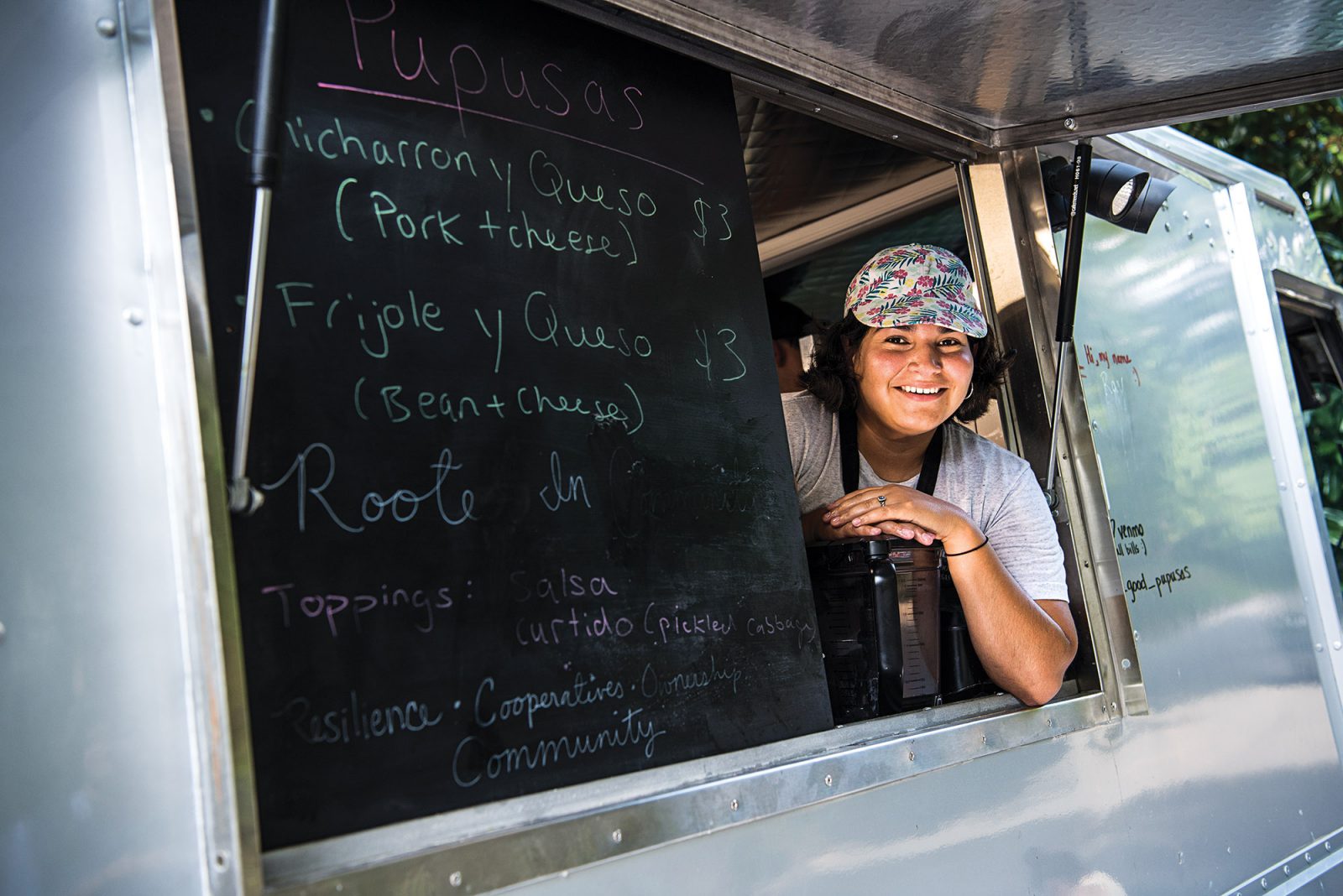
Cecilia Polanco ’16. (Photo by Grant Halverson ’93)
Pupusas, a Side of Mentoring and a Share of the Profits
Cecilia Polanco’s father was fleeing El Salvador’s civil war when he crossed the U.S. border illegally in the early 1980s. He was a 26-year-old veteran, and both the military and guerrillas were trying to recruit him. “Just saying no was enough to be called a traitor,” said Polanco ’16. “That was enough to get killed.” In their village, the family heard gunshots at night and woke to the task of moving bodies.
Reuniting in California, Polanco’s parents and three older sisters received asylum and eventually citizenship. She was born in Los Angeles, then moved to Durham as a baby — the first in her family to start life as a U.S. citizen. “I remember [an aunt’s] comment: ‘You can’t waste being documented. There are people who would give so much to work and to study.’”
Reminders of her advantages came at every turn. She earned a Morehead-Cain Scholarship. She knew the merit-based program was closed to her undocumented classmates, who carried burdens she couldn’t even fathom: “ ‘Have my parents made it home safely from work?’ ‘Does my sibling need medicine? Does someone with a license have to go into the pharmacy to get that medicine?’”
By her sophomore year, Polanco had hatched an idea. She would create a scholarship fund for undocumented students. And she would fund it by selling pupusas, the thick, stuffed corn tortillas that are El Salvador’s national dish and a staple in her mother’s kitchen.
Polanco tapped into the Morehead-Cain Discovery Fund to earn a business essentials certificate from UNC’s Kenan-Flagler Business School. She also used her scholarship to do independent research on pupusas and food trucks. She wrote a business plan, made her first sales and bought her first truck. By March 2017, she had bought a better truck and was slinging pupusas outside the Morehead Planetarium and Science Center.
Profits from Polanco’s So Good Pupusas are channeled to a fund that gives renewable $1,000-a-year scholarships with a side order of mentoring. It made its first grant in 2016-17, and she plans to add two recipients each year. Because the awards are small, Polanco calls them last-dollar scholarships, designed for students who have other funding. The money might help with taxes, emergencies, immigration lawyers, phone bills or clothes for job interviews.
“Carolina emphasizes your heel print,” she said. “It’s the Carolina way to better the world.” Polanco also notes the influence of her parents, who are forever feeding, lodging and lending money to others.
“When you have enough, you always have something to give. Even when you have nothing, you have something to give.”
— Barry Yeoman
Spellings’ column and the March letter focused on federal policy. But states also help determine whether childhood arrivals can attend (and afford) college. On the restrictive end are Alabama, Georgia and South Carolina, which bar undocumented immigrants from enrolling at all on some public campuses. By contrast, 20 states offer in-state tuition, according to a 2015 report by the National Conference of State Legislatures.
North Carolina’s policy of charging out-of-state tuition, along with the bans on federal and state financial aid, has been a source of frustration on campus. At $35,588, nonresident tuition and fees are more than three times the in-state rate of $9,005 — and almost exactly the median household income of $35,000 for North Carolina residents who are not U.S. citizens.
“It’s very emotional for staff to look students in the eye and say, ‘I’m sorry, there isn’t anything for you,’ ” said Feldman, the student aid director. Because of private donors, “we have a very tiny amount of merit-based scholarship that we’ve been able to stretch to a handful of students. Unfortunately, the population of students who qualify for DACA is growing, and we don’t have any resources to keep up with that growth.”
Spellings says she favors in-state tuition for childhood arrivals, noting that states gain a “competitive advantage” by making college more accessible. That includes her home state of Texas, which offers both in-state tuition and financial aid to undocumented students. “We’re a majority-minority population,” she said of Texas, where nonwhites constitute a majority. “If you want to grow and thrive with that kind of demographic change, you better make sure you have an educated populace, especially in a global knowledge economy.”
To change the tuition policy, the UNC System would need authorization from the N.C. General Assembly, which is now controlled by Republicans and has rebuffed several attempts. GOP lawmakers bristle at rolling back tuition during tight budget times. Some question whether students like Cisneros should attend public universities at all.
“They came to the country illegally, and that makes them a criminal,” said Rep. George Cleveland, a Republican from Jacksonville. “Just because mommy and daddy brought me here when I was 6 years old does not absolve me of the fact that I am not a citizen of the United States, and I should not get the rewards that citizens of the United States get.”
Spellings, also a Republican, notes that some states offering tuition equality, including Texas and Utah, are just as conservative as North Carolina. “It’s not just a coastal phenomenon,” she said. (That said, Texas’ Republican attorney general, Ken Paxton, led the 10-state effort to end DACA.)
At Carolina, a student-led initiative called “One State, One Rate” has been organizing since 2013, with support from the Faculty Council. So far, campus and UNC System administrators have not lent political muscle to the effort. “There’s no doubt the University cares about these students and provides an environment that is welcoming and supportive,” said NC Sli co-founder Paul Cuadros, an associate professor of media and journalism. “On the other hand, the advocacy for these students when it comes to financial access to this and other [UNC] System universities has not generally been there with the General Assembly.”
Spellings says the time isn’t right for a lobbying push. “The first [priority] is clarity around federal policy,” she said, “The day will come that the Legislature will need to confront these issues as we change and grow — of course we will. Whether North Carolina’s ready for that, I don’t know.”
Living with pressure
To the degree that DACA recipients feel safe at Carolina, they say it’s because of their classmates, teachers and other campus allies. “Chapel Hill is a little bubble,” said Jackie, a 2017 graduate from Mexico who asked that her last name be withheld because of the national political climate. “I knew I was protected because the people that I know here care about me.”
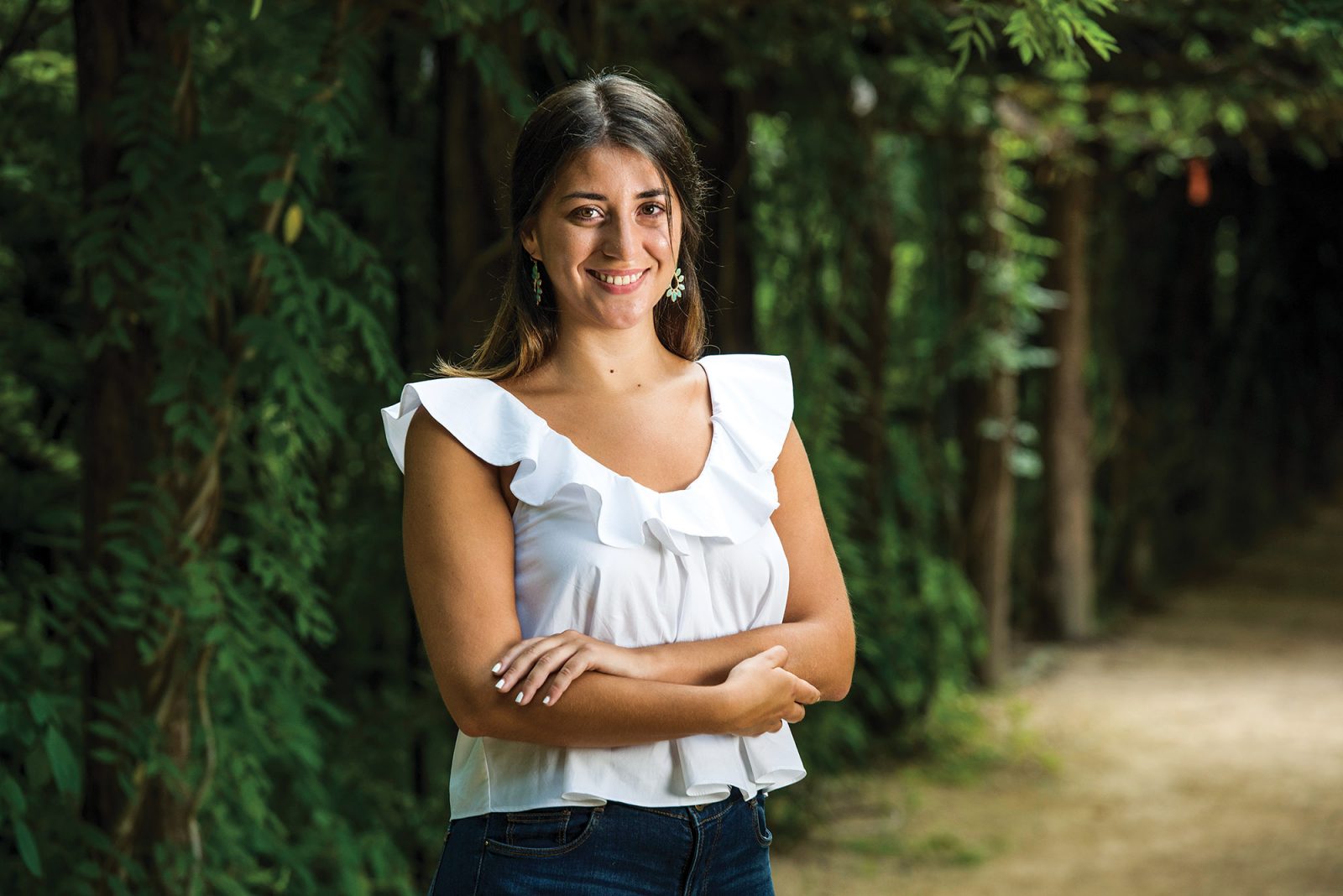
Barbara Sostaita is studying for her doctorate, now with a green card in hand. She also shares advice to help support undocumented students. (Photo by Grant Halverson ’93)
Barbara Sostaita, a once-undocumented doctoral student in religious studies who now holds a green card, said there’s a wide support network on campus that includes DACA recipients and members of other vulnerable groups, including African-American and LGBTQ students. “We’re checking in on each other,” she said, “making sure we’re doing OK. Asking about each other’s families.”
In April, three members of that network — Sostaita, Franco and Todd Ramon Ochoa, an associate professor in religious studies — hosted a one-day training workshop by the national immigrant-rights group United We Dream. The workshop focused on how to support undocumented students. About 40 attendees came from across University sectors, and Franco was particularly heartened to see administrators there.
“They had no idea about the pressures we go through, like having to check on our parents on a daily basis to make sure they haven’t been pulled over or detained.”
The workshop reflected a history of activism by this generation of young immigrants, a history that predates DACA. About 10 years ago, police in North Carolina and elsewhere, deputized to enforce federal immigration policy, began cracking down on undocumented residents who had committed minor traffic offenses.
“People didn’t sit around,” said the Latino Migration Project’s Gill. “Young people came out of the shadows — to use their own language — and they told their stories. One person did it, and then the next, and then the next. By having safety in numbers, they were able to shape public opinion.” That national movement — which, Gill notes, had “important leaders in North Carolina” — helped build support for Obama’s policy toward childhood arrivals.
Trump’s election amped up the activism at Carolina. Since November, thousands have signed a petition asking the University to “refuse to comply with immigration authorities regarding deportations or raids.” The petition also calls for the University to proclaim itself a “sanctuary” campus and provide “refuge for students facing deportation proceedings.” (In an open letter, Folt and two colleagues said that the University “must comply with all federal and state laws” but that the institution “staunchly” safeguards student and employee privacy. Federal law, they noted, protects a student’s immigration status from disclosure.)
Meanwhile, DACA recipients are trying to get on with their academic and professional lives. Jackie, the student who asked that her last name be withheld, is working for a Durham nonprofit as a college readiness counselor. Franco is wrapping up her undergraduate degree and looking toward a career in social work. She envisions working in a hospital setting, supporting families as they suffer through trauma.
And Cisneros has left for intensive teacher training. With a fellowship from the Alliance for Catholic Education, this summer he completed eight weeks of coursework on Notre Dame’s Indiana campus. Then he moved again to Dallas, where he’s spending this academic year teaching middle-school social studies. He’ll repeat the cycle once more on the way to the master’s degree he hopes to earn in 2019.
Cisneros says bipartisan support for a legislative solution keeps him positive. He nonetheless worries about living so far from his family. He wonders “if things get worse, what I’m going to do, how I’m going to stay in touch.” But the U.S. is a country where ambitious young adults move around in preparation for their careers. And this country, as Spellings suggested in her column, is the only one he’s ever really known.
Barry Yeoman is a freelance writer based in Durham.
Thanks for reading the Carolina Alumni Review
Carolina Alumni members, sign in to continue reading.
Not yet a member? Become one today.
